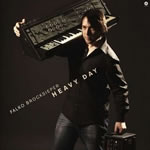|
|
 |
Dusted Reviews
Artist: Falko Brocksieper Album: Heavy Day Label: Sub Static Review date: Jul. 10, 2008 |

|
|
|
 |
Falko Brocksieper is one of the Sub Static imprint’s more reliable producers. I say ‘more reliable’ because, at least in their first couple of years, Sub Static came to personify reliability – which is to say, you’d not be surprised by one of their records, inclining as they did/do toward sleek tech-house with added, discrete detailing, but their singles were consistently of high quality. With his second album, Heavy Day, Brocksieper doesn’t change things too much, and while that means some of the album veers toward filler or homogeneity, a risk for most tech-house albums these days, there’s a small clutch of lovely songs here, as well.
Brocksieper teases the listener with stretches of non-event, but not unduly: one of the album’s highlights, “Zychological,” feels slight at first, until it shifts to a downward descending chord change after two and a half minutes. Combined with stray trails of clattering percussion and blurred delay effects, this short section adds structural intrigue; the compulsive repetition of the word “psychological” afterward reinforces the strange mood – simultaneously tetchy and sleekly propulsive – that characterizes Brocksieper’s best productions.
Brocksieper’s also a collaborative sort: “Emotional Support,” featuring one of tech-house’s most persistent melancholists, Richard Davis, sounds like it could have fallen from one of the latter’s albums, though in the process it’s lost some of Davis’s melodic voluptuousness. Contrastingly, when Sub Static’s Michaela Grobelny (aka M.I.A.) steps up to the mic, her Sprechstimme merges nicely with Brocksieper’s woozy bass and tentative, delay-ridden, chiming chords. It’s followed by the buzzes of the closing “Homecoming,” whose textures recall unearthed wiring, or electrical interference.
If there’s been any shift or development in Brocksieper’s work over the past five years, it’s in the overarching mood of his productions, which sometimes feel more downcast than before: the winding melodies that stretch like cat’s limbs through “Face It” are elegiac; “Emotional Support” is borderline weepy at times. This shift in emotional engagement is welcome – this isn’t faceless techno – though Brocksieper does still, on occasion, resign himself to piloting the merely serviceable without too much thrill.
By Jon Dale
|







